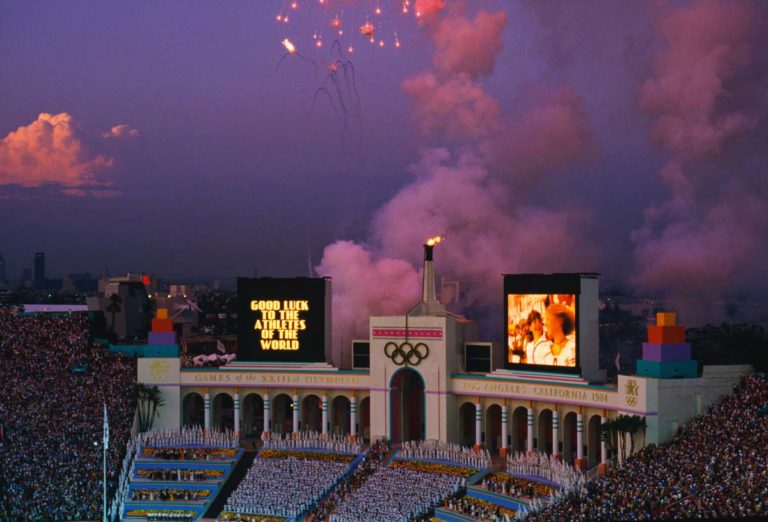
The Los Angeles 1984 Summer Olympics introduced several innovations, such as the first-ever computerized scoring systems. These Olympics were financially successful, mainly due to corporate sponsorships and limited public funding.
As a result, the 1984 Summer Olympics were a triumph for the United States: They established a legacy of organizational proficiency (expected from the upcoming Paris 2024 games). And they infused the city with a dramatic economic impact.
With the return to Los Angeles of the Summer Olympics just four years away, I share the civic pride of L.A. in the international spotlight. And yet, in terms of equitable impact, it is clear that the 1984 Olympics failed to get all of the city’s economic players into the game. They proved, once again, how the Black community rarely scores a home run, despite demonstrating prowess on the field.
There are specific policy and market-based reasons why my community has been unable to reap the largess of events such as the Olympics. They are part of the institutional handicaps – such as the “redlining” of Black neighborhoods, which stifled generational wealth – that has kept these communities stranded on third base for centuries.
There are specific policy
and market-based reasons why
my community has been unable to reap the largess of events such as
the Olympics.
Housing is still a concern
Housing and real estate were instrumental in the concentrated disadvantage of Blacks in all U.S. cities. Government and private actors erected barriers to investment and homeownership in Black communities. According to the 2023 “State of Black Los Angeles County Report,” Black people have the region’s smallest homeownership rate: 33.5%, compared to Whites at 53.9%. Consider the impact on the economic game where the average White home value exceeds Black home values 1.65 times, and where many Black neighborhoods are locked in a downward spiral of devaluation, disinvestment and deterioration.
With the arrival of the LA28 games, I share the concern that infrastructure investments, which hold the promise of elevating property values, will once again strand or even price out many longtime residents.
What needs to be done
I am joining the city’s top business and development experts in “Urban Marketplace 24: From LA84 to LA28 and Beyond,” presented by Urban Land Institute, Los Angeles District Council, on April 24 at the Beehive in South Los Angeles. “Insights and Investments to Narrow the Racial Wealth Gap” will offer examples of how business, community and political leaders can coach investment in historically underserved Black and brown communities.
With an emphasis on wealth enhancement, Urban Marketplace offers achievable means of environmental equity and social justice. We suggest the following steps:
1. Monitoring and Evaluation: Establish a system to assess the impact of the Olympics on low-income communities. This will help identify areas of improvement so that economic benefits reach people and places that most need it.
2. Infrastructure Development: Invest in low-income areas, including transportation, housing and public spaces. This will improve the quality of life and create a foundation for improving the built environment where equitable development is needed, and deployment of capital jump-starts job opportunities during the construction phase.
3. Job Creation and Training: Implement employment opportunities for residents in low-income communities. This can include workforce-development initiatives, apprenticeship programs and partnerships with local businesses and organizations.
4. Small-Business Support: Help ensure that low-income communities can benefit from increased economic activity during the Olympics. This can include access to capital, technical assistance, corporate mentorship programs and marketing assistance to local business improvement districts.
5. Attainable Housing: Develop inclusive housing options in close proximity to Olympic venues to ensure that low-income residents have improved access and benefit from the Games. This can be achieved with community-based housing developers and inclusionary zoning policies. Innovative ownership options must also be designed and deployed.
6. Community Facilities and Programs: Enhance and create parks, recreational centers and youth programs in low-income areas. This will provide opportunities for residents to engage in the many sports, recreational and cultural events associated with the Olympics.
7. Education and Youth Development: Invest in educational programs and initiatives for youth development in low-income communities. This can include programs such the ULI Los Angeles’ UrbanPlan, which introduces high school students to the trade-offs and risks at play in the entitlement and negotiation process associated with real estate development, especially in public/private partnerships. Also deserving support are mentoring programs and after-school activities that promote sports, arts, financial literacy and basic academic achievements.
8. Environmental, Social and Governance Principles: Ensure that all aspects of the Olympic experience are planned and executed with an ESG focus. This can include promoting renewable energy, waste reduction and environmentally friendly transportation options.
9. Community Engagement: Engage with local leaders, organizations and residents to understand their needs, concerns and aspirations, and directly address the specific challenges faced by low-income communities.
By implementing these steps, Los Angeles can ensure that the 2028 Olympics leave a positive and lasting impact on its low-income communities.
Michael Banner was raised in Watts and attended Jordan High School. He is president and CEO of the Los Angeles LDC, a mission-driven community development financial advisory organization. He is a founding member of the ULI Los Angeles Urban Marketplace.
